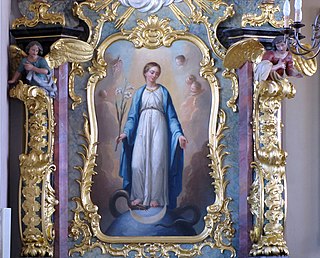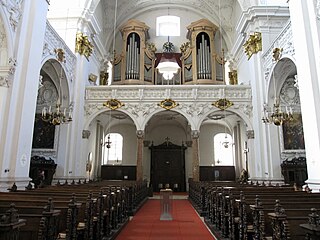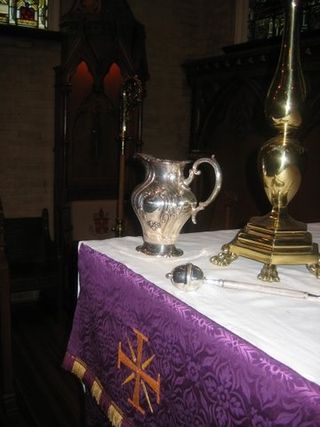
Virga Jesse, WAB 52, is a motet by the Austrian composer Anton Bruckner. It sets the gradual Virga Jesse floruit for unaccompanied mixed choir.

Afferentur regi, WAB 1, is a motet, which Anton Bruckner composed on 7 November 1861 on the text of the Offertorium of the Missa pro Virgine et Martyre.

Tota pulchra es, WAB 46, is a sacred motet by the Austrian composer Anton Bruckner.

Ave Maria, WAB 6, is a sacred motet by Anton Bruckner, a setting of the Latin prayer Ave Maria. He composed it in Linz in 1861 and scored the short work in F major for seven unaccompanied voices. The piece, sometimes named an Offertorium, was published in Vienna in 1867. Before, Bruckner composed the same prayer in 1856 for soprano, alto, a four-part mixed choir, organ and cello, WAB 5. Later, he set the text in 1882 for a solo voice (alto) and keyboard, WAB 7.

Ave Maria, WAB 5, is a setting of the Latin prayer Ave Maria by Anton Bruckner.

Christus factus est, WAB 11, is a sacred motet by Anton Bruckner, his third setting of the Latin gradual Christus factus est, composed in 1884. Before, Bruckner composed in 1844 a first piece on the same text as gradual of the Messe für den Gründonnerstag, and in 1873 a motet for eight-part mixed choir, three trombones, and string instruments ad libitum. The motet is an expressive setting of the gradual, influenced by Wagner's music.

Os justi, WAB 30, is a sacred motet composed by Anton Bruckner in 1879. Os Justi is a Gregorian chant used as gradual of the Commune Doctorum, and as introit I and gradual II of the Commune Confessoris non Pontificis.

The two Asperges me, WAB 3, are sacred motets composed by Anton Bruckner. They are settings of the Latin Asperges me, the antiphon used for the celebration of Asperges.

Dir, Herr, dir will ich mich ergeben, WAB 12, is a sacred motet composed by Anton Bruckner in c. 1845.

Libera me, WAB 21, is the first of two settings of the absoute Libera me, composed by Anton Bruckner in c. 1843.

Tantum ergo, WAB 32, is the first of eight settings of the hymn Tantum ergo composed by Anton Bruckner in 1845.

Tantum ergo, WAB 43, is the second of eight settings of the hymn Tantum ergo composed by Anton Bruckner in c. 1845.

The four Tantum ergo, WAB 41, are settings of the hymn Tantum ergo composed by Anton Bruckner in 1846.

Tantum ergo, WAB 42, is a setting of the hymn Tantum ergo composed by Anton Bruckner in 1846.

Tantum ergo, WAB 44, is the last of eight settings of the hymn Tantum ergo composed by Anton Bruckner in c. 1854.

Herz Jesu-Lied, WAB 144, is the second of two motets of Anton Bruckner's St. Florian period, which is of uncertain authorship. If Bruckner was the composer, it was composed presumably in 1845-1846.

The Two Aequali, WAB 114 & WAB 149, were composed by Anton Bruckner in 1847.

Inveni David, WAB 19, is a sacred motet composed by Anton Bruckner in 1868.

Iam lucis orto sidere, WAB 18, is a motet composed by Anton Bruckner in 1868. The work is also known as In S. Angelum custodem. Bruckner revised the composition in 1886.



















